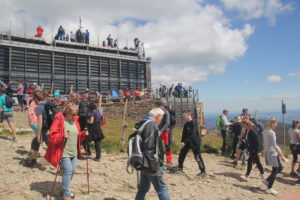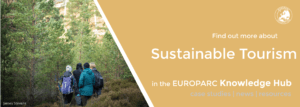COVID-19 takes a heavy toll on Protected Areas and nature conservation
Protected Area rangers play an essential role in nature conservation and environmental education. Photo: Kullaberg Nature Reserve
Consequences of the pandemic pose severe threats to Protected Areas and nature conservation efforts around the world. This gloomy conclusion results from a series of new research papers and articles published last week by IUCN.
The COVID-19 pandemic and its economic consequences have caused job losses among Protected Areas rangers, cuts in environmental protection funding and collapse in ecotourism around the globe. Needless to say, these setbacks could undermine global efforts to halt biodiversity loss and climate change.
Dr Bruno Oberle, IUCN Director General commented:
While the global health crisis remains priority, this new research reveals just how severe a toll the COVID-19 pandemic has taken on conservation efforts and on communities dedicated to protecting nature.
Published in a special issue of PARKS – the journal of the IUCN World Commission on Protected Areas, a collection of new studies and articles analysed the impacts of the pandemic on Protected Area operations. The publication also examined implications for recently adopted environmental policies, and how they are reflected in economic recovery packages and other governmental policies.
Budget cuts and collapse in tourism revenue
According to the IUCN synthesis, conservation efforts were most severely hit in Africa and Asia. More than half of Protected Areas in Africa, and about a quarter in Asia, reported that they had to halt or reduce field patrols and anti-poaching operations, as well as environmental education activities.
The pandemic was also a hard blow for the livelihoods of rangers and their communities. A survey of rangers in more than 60 countries found that more than one in four rangers had seen their salary reduced or delayed, while 20% said that they had lost their jobs due to the pandemic-related budget cuts.
What is the situation in Europe?
Despite closures and losses of tourism revenue, most Protected Areas in Europe maintained their core conservation operations. The surveys also show that European rangers weren’t affected as strongly as their peers from Central America and the Caribbean, South America, Africa and Asia.

Overcrowding of Europe’s Protected Areas posed serious issues during the first COVID wave. Photo: Jakub Kaspar
However, European Protected Areas have also met significant challenges arising from the COVID-19 pandemic. A study by FIDELIO research project found that impacts of COVID-19 and their policy implications put unexpected pressure on the parks and their staff, which naturally generated pleas for more support. These new challenges were mainly connected to overcrowding, new profile of visitors, their problematic behavior and conflicts between different groups.
COVID-19 and environmental policy
To also shed light on the impacts of the pandemic on environmental policy, the report analysed economic recovery packages and other government policies that were implemented or advanced in 2020. The experts identified some positive examples explicitly benefitting Protected Areas or scaling up environmental protection. For example, eight EU countries have set aside funding to expand or better manage Protected Areas, natural capital and the circular economy.
While 17 countries have maintained or increased their support for Protected Areas, 22 countries have on the contrary rolled back their environmental protection. In some cases, governments have even considered proposals to allow mining and fossil fuel extraction in Protected Areas. Mentioned in the report are for example proposals by the Brazilian government to allow mining and fossil fuel extraction in indigenous reserves, new permits in Russia to allow deforestation for transport and infrastructure in natural areas, and plans to explore and drill for oil and gas in the US Arctic.
Knowing the importance of healthy and protected nature, EUROPARC stands by all the affected Protected Areas and their rangers around the world. As expressed by Carlos Manuel Rodríguez, head of the Global Environment Facility:
We cannot say we are building back better unless we do so whilst also protecting the natural world.
As we might be slowly emerging out of the crisis with available vaccination, the time to design a better future is now. And if we want to build back better, the recovery needs to include a better protection of rangers and their livelihoods around the world, societies and nature resistant to climate change, and a more sustainable tourism sector.
Read about Sustainable Tourism and the European Charter for Sustainable Tourism in Protected Areas!
